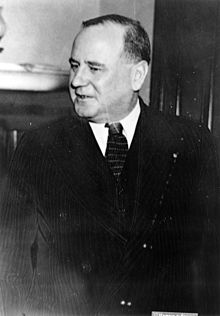Bennett Champ Clark
Bennett Champ Clark | |
|---|---|
 | |
| United States Senator from Missouri | |
| In office February 3, 1933 – January 3, 1945 Serving with Roscoe C. Patterson, Harry S. Truman | |
| Preceded by | Harry B. Hawes |
| Succeeded by | Forrest C. Donnell |
| Court of Appeals for the D. C. Circuit associate judge | |
| In office 1945 – July 13, 1954 | |
| Nominated by | Harry S. Truman |
| Preceded by | Thurman Arnold |
| Succeeded by | Walter Maximillian Bastian |
| Personal details | |
| Born | January 8, 1890 Bowling Green, Missouri |
| Died | July 13, 1954 (aged 64) Gloucester, Massachusetts |
| Resting place | Arlington National Cemetery |
| Nationality | United States |
| Political party | Democratic |
| Alma mater | University of Missouri George Washington University Law School |
| Occupation | Lawyer |
| Military service | |
| Branch/service | United States Army |
| Years of service | 1917–1919 |
| Rank | Colonel |
| Battles/wars | World War I |
Joel Bennett Clark (January 8, 1890 – July 13, 1954), better known as Bennett Champ Clark, was a Democratic United States Senator from Missouri from 1933 until 1945, and was later a United States federal judge.
Political career
The son of Champ Clark, a prominent Democratic Party leader of the early 20th century, Bennett Clark was born in Bowling Green, Missouri.

After graduating with a B.A. from the University of Missouri in Columbia, Missouri in 1912, he earned an LL.B. at George Washington University. He became parliamentarian of the United States House of Representatives from 1913 to 1917. After serving as a colonel in the United States Army during World War I, from 1917 to 1919, Clark began practising law in St. Louis, Missouri.
In the 1932 election, Clark was elected to the United States Senate as a Democrat. Clark entered the Senate after Senator Harry B. Hawes resigned on February 3, 1933, a month before his term was to end. Clark was re-elected in the 1938 election, but lost his bid for renomination in the 1944 election.
In April 1943 a confidential analysis by British scholar Isaiah Berlin of the Senate Foreign Relations Committee for the British Foreign Office succinctly characterized Clark as, in his strongly partisan view:
a rabid isolationist and member of the American First Committee who has steadily voted against all the foreign policies and war measures of the Administration with the exception of the reciprocal trade agreements (in which the corn exporters of Missouri have some interest). A member of the Wheeler-Nye-[Robert A.] Taft coterie. An avowed Anglophobe.[1]
Clark is perhaps most famous for declaring that Emperor Hirohito should be hanged as a war criminal on the senate floor on January 29, 1944. In the same year, he was the first senator to introduce the G.I. Bill proposal in U.S. Congress.[2]
When Congress began work on the G.I. Bill in 1944 it had originally expressed concern about possible misuse of the "Blue discharge" (now called an "Other Than Honorable discharge"). In testimony before the United States Senate, Rear Admiral Randall Jacobs strongly opposed the provision to include Veterans with Blue discharges on the grounds that it would undermine morale and remove any incentive to maintain a good service record. Senator Clark, a sponsor (writer) of the GI Bill, dismissed his concerns, calling them "some of the most stupid, short-sighted objections which could be raised".[3]Clark went on to say:
The Army is giving Blue discharges, namely discharges without honor, to those who have had no fault other than they have not shown sufficient aptitude for military service. I say that when the government puts a man in the military service and, thereafter, because the man does not show sufficient aptitude gives him a blue discharge, or a discharge without honor, that fact should not be permitted to prevent the man from receiving the benefits to which soldiers are generally entitled.[4]
On September 12, 1945, Clark was nominated by President Harry S. Truman to a seat on the United States Court of Appeals for the D.C. Circuit vacated by the resignation of Thurman Arnold. Clark was confirmed by the United States Senate on September 24, 1945, and received his commission on September 28, 1945, serving thereafter until his death. He died in Gloucester, Massachusetts, on July 13, 1954, and was buried at Arlington National Cemetery.
References
- Bennett Champ Clark at the Biographical Directory of Federal Judges, a publication of the Federal Judicial Center.
- ^ Hachey, Thomas E. (Winter 1973–1974). "American Profiles on Capitol Hill: A Confidential Study for the British Foreign Office in 1943" (PDF). Wisconsin Magazine of History. 57 (2): 141–153. JSTOR 4634869. Archived from the original (PDF) on October 21, 2013.
{{cite journal}}: Unknown parameter|deadurl=ignored (|url-status=suggested) (help) - ^ G.I. Bill of Rights, TIME Magazine, April 3, 1944
- ^ Bennett (1999), p. 143.
- ^ Bennett (1999), p. 141.
Further reading
- Spencer, Thomas T. (1981). "Bennett Champ Clark and the 1936 Presidential Campaign". Missouri Historical Review. 75: 197–213.
{{cite journal}}: Cite has empty unknown parameters:|month=and|coauthors=(help)
- 1890 births
- 1954 deaths
- American Presbyterians
- Judges of the United States Court of Appeals for the D.C. Circuit
- United States court of appeals judges appointed by Harry S. Truman
- United States Senators from Missouri
- University of Missouri alumni
- George Washington University Law School alumni
- Democratic Party United States Senators
- Missouri Democrats
- United States Army colonels
- Burials at Arlington National Cemetery
- Old Right (United States)

